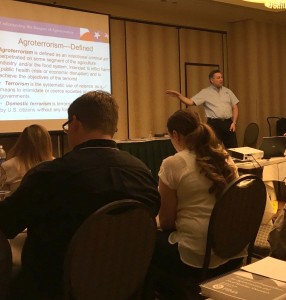WIFSS Training Rural Area First Responders
Chris Brunner, May 5, 2016

WIFSS’ David Goldenberg leads discussion during New Mexico agroterrorism awareness courses.
New Mexico State University’s Southwest Border Protection and Emergency Preparedness Center hosted a full day of intensive training outlining the potential effects of possible types of agroterrorism, and the impact of an incident on the entire food system or on a specific segment of the food system.
David Goldenberg, a food safety and security training coordinator with the Western Institute for Food Safety and Security, WIFSS, UC Davis, taught the courses held in Albuquerque, NM, on April 27. Goldenberg’s training included active discussions and table top exercises for the Department of Homeland and Security courses on AWR 151 Understanding the Dangers of Agroterrorism and AWR 152 Principles of Preparedness for Agroterrorism and Food System Disasters.
Twenty-two students representing the military, county sheriff agencies, livestock boards, the New Mexico State Department of Agriculture, the USDA’s Food Safety and Inspection Service, and the Southwest Border Food Protection and Emergency Preparedness Center, attended the training session.
The tabletop exercise aided participants in understanding the importance of preplanning to create an effective community response to individual acts of potential terrorism or natural disasters to be better prepared and understand their roles should they respond. Participants were challenged coming up with a solution to the case scenario of an intentional tampering of a water supply for a produce crop. Water is limited in New Mexico and most croplands must be irrigated, so an intentional tampering of a water supply has serious economic implications. The leading crop is hay used to feed cattle. Cattle and dairy ranching are the leading agricultural activities in New Mexico. Pecans rank second behind hay in crop production.
AWR 151 and 152 are offered by the Rural Domestic Preparedness Consortium (RDPC), a partner of the National Domestic Preparedness Consortium, which is a DHS/FEMA training partner under DHS/FEMA’s Homeland Security National Training Program Cooperative Agreement. WIFSS teaches Department of Homeland Security certified courses that are offered through the RDPC and aim to train first responders in rural areas of the country for disaster situations that involve or directly affect our food supply system.
Next up, the WIFSS team, will be teaching courses on frontline response and recovery from an agroterroism incident, to be held in Missouri in May.
